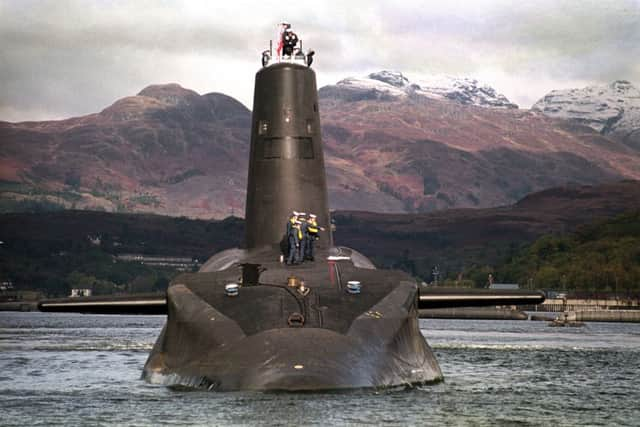Leaders: When a nuclear deterrent is not a nuclear deterrent


Labour leader Jeremy Corbyn suggested in a television interview yesterday that the UK could keep its Trident nuclear fleet but without carrying nuclear warheads. It is a startling suggestion that will struggle to gain credibility.
Mr Corbyn has made clear his long-standing opposition to nuclear weapons and that he regards Trident, based in Faslane, as a relic from a “cold war generation” incapable of protecting the UK from current threats. He wants Britain to take a lead in “nuclear de-escalation”.
Advertisement
Hide AdAdvertisement
Hide AdThe proposal is clearly designed to protect his position while seeking to avoid a major rift within his party. Many of its enthusiastic new supporters are opposed to Trident but within the Shadow Cabinet there is strong support for retaining Trident, and for some a decision not to proceed with its renewal would be a resigning matter.
The idea of Trident without nuclear warheads is not without precedent. Shadow defence secretary Emily Thornberry, who is leading the Labour Party’s rethink on nuclear weapons renewal, said yesterday the idea of submarines equipped with conventional warheads, but with the potential to have a nuclear capability, was a posture adopted by Japan. It was, she said, “certainly one option that is available to us and one thing that needs to be looked at”.
However, the suggestion is unlikely to bridge Labour’s divisions. John Woodcock, the Labour MP for Barrow and Furness where the replacement submarines will be built, said yesterday that having a deterrent that has no ability to deter because it has no missiles “is like having an army with broken rifles and no ammunition”. And defence experts have cast doubt on the idea as Trident submarines are designed specifically to carry nuclear warheads and not conventional weapons.
The proposal has already opened the party leader to the charge that by removing the nuclear warheads this would fundamentally compromise the role of Trident as a deterrent to nuclear attack. What then would be the point of Trident, with renewal costs estimated at between £31 billion and £60bn?
But the issue is of course more complex. The Trident programme secures many thousands of jobs in the UK ,and in the shipbuilding, engineering and advanced electronics sectors in particular. Mr Corbyn declared yesterday that protecting defence jobs would be his “first priority”. The non-nuclear Trident option is thus being floated as the basis for a compromise that might secure Shadow Cabinet acquiescence while maintaining the support of union leaders such as Unite leader Len McCluskey who have warned that scrapping Trident could devastate communities reliant on the defence industry.
With MPs set to vote on whether to renew Trident by building four new Vanguard submarines later this year, the argument within Labour is set to grow more intense.
And the Conservatives would lose no opportunity in portraying Labour as weak on defence. Under scrutiny it is doubtful this proposal will survive long.
Tangled up in blue formula
It’s here – Blue Monday has arrived! You thought it was pretty blue last Monday, very blue on Tuesday and midnight black last Wednesday? And wasn’t the wettest day last July really, truly blue?
Advertisement
Hide AdAdvertisement
Hide AdBut the third Monday in January is now widely regarded as the most depressing day of the year – more depressing than all the other blue days. Eternal optimists are apt to brush this aside as a PR stunt to prompt us into booking holidays or buying stuff.
But it doesn’t take a feat of calculus to discover this is the time of year when the weather is worst, debt levels are close to their highest and those New Year resolutions have been all but abandoned.
Psychologist Dr Cliff Arnall even created a “scientific” formula to prove why Blue Monday really is blue – [W+(D-d)] x TQ/MxNA – where W is weather, D is debt, d monthly salary, T time since Christmas, Q time since failure of attempt to give something up, M is low motivational level and NA the need to take action.
So, even if we woke up feeling cheerful, sitting down to work out the formula would be enough to guarantee despair. And it may be worse this year because of the long period of truly awful weather.
However, there is one positive feature about Blue Monday. It can’t get any worse. By definition tomorrow will be better. Wednesday we will see an upbeat change. .
Meanwhile, Blue Monday is best beaten back by counting our blessings, grabbing natural light to lift those mood hormones, taking aerobic exercise, smiling and good deeds. Ponder all these as we start the day and Blue Monday will never be the same again – just that little bit worse.